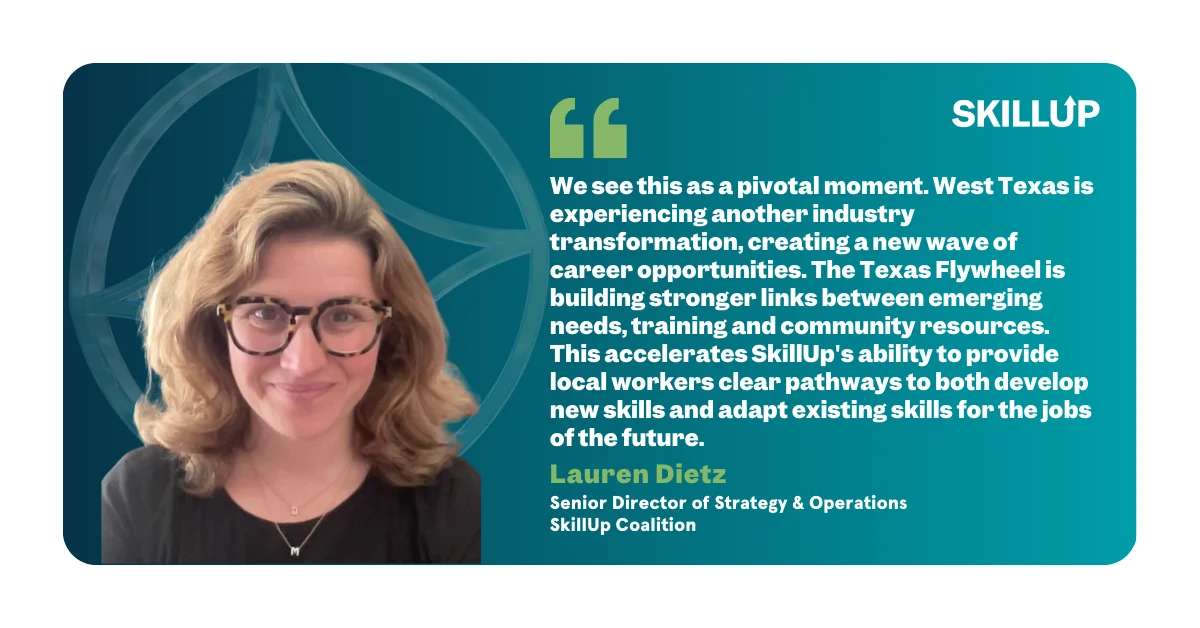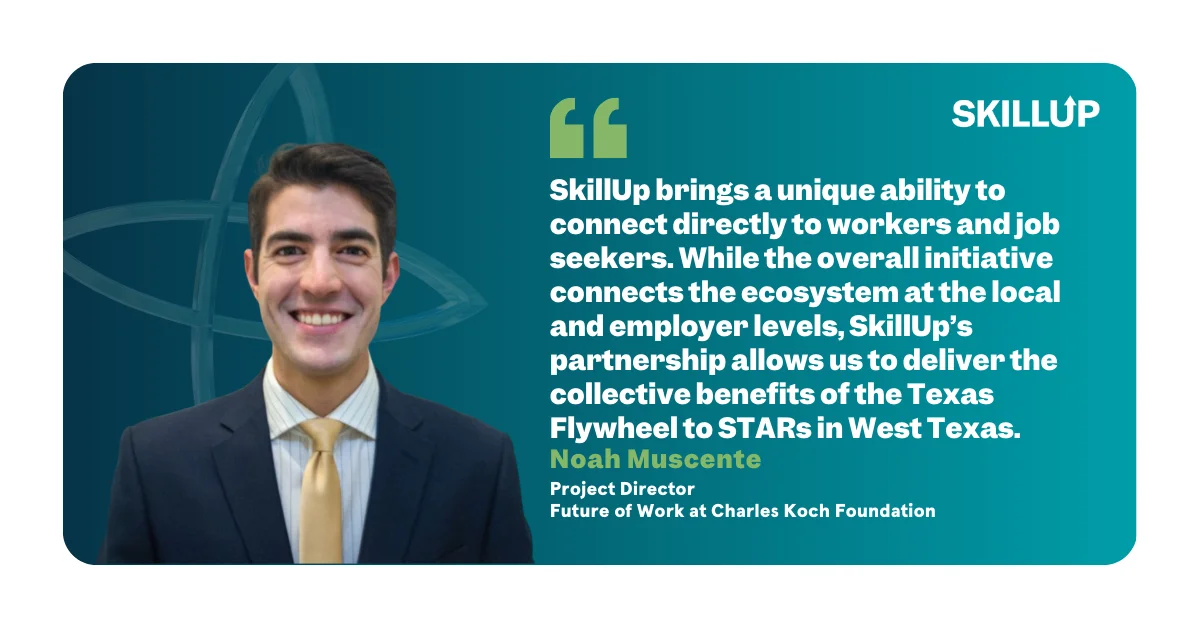Texas is no stranger to big opportunities. Right now, the state is at the forefront of the $500 billion Stargate Project, set to build the AI infrastructure powering the next era of technology. Much of that growth will land in West Texas — a region with a proud history of channeling its energy abundance to fuel America’s progress. But with rural workforce shortages already straining local employers, the question is clear: how do we ensure West Texas is ready to meet the demand?
That demand isn’t just for software engineers. Data centers spark a wide ecosystem of high-opportunity jobs — from skilled trades to technical support — that offer stability, growth and family-sustaining wages for workers skilled through alternative routes (STARs).
Through the Texas Flywheel initiative with Charles Koch Foundation and Education Design Lab, we’ve launched a West Texas-specific strategy to connect local residents to the training, employers, and career navigation tools they need to step into these emerging opportunities in locally relevant, high-growth industries.
“Our goal for the Texas Flywheel is to build a new ecosystem of career-connected pathways that expand opportunity in the digital economy to millions of people in the state,” said Noah Muscente, Project Director for Future of Work at Charles Koch Foundation. “SkillUp’s ability to reach and engage STARs at scale makes them an essential partner in actualizing this vision to unlock shared prosperity and purpose through the rapidly growing data center industry in West Texas.”
Meeting the Moment in West Texas
The Texas Flywheel Initiative is an employer-led effort designed to align education, training and hiring practices with the needs of the state’s growing digital economy. While it spans multiple regions, West Texas has emerged as a high-priority growth market for data center development.
“We see this as a pivotal moment. West Texas is experiencing another industry transformation, creating a new wave of career opportunities. The Texas Flywheel is building stronger links between emerging needs, training and community resources,” says Lauren Dietz, SkillUp’s Senior Director of Strategy & Operations. “This accelerates SkillUp's ability to provide local workers clear pathways to both develop new skills and adapt existing skills for the jobs of the future.”

In West Texas, we prioritize efforts that:
- Tailor career exploration resources to West Texas
- Give visibility into local data center career pathways and related low-cost, high-return training opportunities
- Promote quality training programs that equip workers for in-demand roles
- Connect STARs directly to locally hiring employers
In early August, we launched our West Texas experience in Abilene and Lubbock, and we will add tailored platforms for Odessa and Midland this fall.
Local-First Matters
For SkillUp, West Texas is part of a broader commitment to regional strategies. In Texas alone, we now have localized platforms in Austin, Dallas, San Antonio, Houston and West Texas. This national-local model allows us to move quickly when new industries or employer needs emerge in a region.
“It’s about meeting STARs where they are, with opportunities that make sense for their local economy,” Dietz explained. “In harbor cities, you may see marine and ship-related trades; in energy hubs, it could be wind or oil-related roles. In West Texas, that means leaning into data center careers. The catalogs are adaptable — but they’re always rooted in local need and relevance.”
The West Texas catalog features many different careers that don’t require a degree, including:
- Network and Computer Systems Administrators
- Software Developers
- Electricians
- Plumbers
- Welders
- Occupational Health and Safety Technicians
- Truck Drivers
And because of the region’s focus on data centers, the following hyper-local careers are featured in the SkillUp West Texas catalog:
- Data Center Technician
- Electrical and Electronic Equipment Assemblers
- Service Unit Operators, Oil and Gas
- Wind Turbine Service Technicians
By pulling in relevant local job postings, no matter how niche a region’s industries are, we make sure that job seekers can tap into opportunities that reflect their community’s needs and employers’ hiring demands.
Scaling Through Partnership
The West Texas initiative wouldn’t be possible without strong employer and partner engagement. Through Texas Flywheel, SkillUp gains access to employers, community-based organizations and community colleges who are invested in building local talent pipelines, while Charles Koch Foundation gains a trusted partner for reaching STARs and connecting them to quality jobs.
“SkillUp brings a unique ability to connect directly to workers and job seekers,” said Muscente. “While the overall initiative connects the ecosystem at the local and employer levels, SkillUp’s partnership allows us to deliver the collective benefits of the Texas Flywheel to STARs in West Texas.”

Looking Ahead
With Abilene and Lubbock already live and Odessa and Midland coming this fall, our next phase will:
- Expand training options aligned to data centers and supporting industries
- Deepen employer partnerships to streamline hiring
- Increase outreach to ensure STARs know these pathways exist and are attainable
“Economic growth means little if the people who live here can’t tap into it,” Dietz said. “Our mission is to make sure the opportunity of West Texas’ digital economy is open to everyone, especially those who have built their skills outside a four-year degree.”
As West Texas’ economy shifts, one thing is clear: by combining local insight, employer leadership and SkillUp’s ability to reach STARs at scale, the Texas Flywheel is starting to turn — and it’s bringing new opportunity with it.
We invite more states to join us.
To learn more about how to begin or advance your skills-first talent practices, join the SkillUp Coalition.




